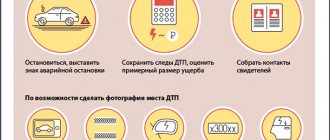CASCO and OSAGO - what are the differences?
First of all, drivers should understand the difference between the two types of insurance, which are widely used in the Russian Federation. In the case of compulsory motor liability insurance, only the owner's liability is insured. This means that if you are the culprit of the accident, then the policy is used to compensate the victim. However, if you were injured, then your compulsory motor liability insurance is not involved, since the payment must be made through the insurance of the person responsible for the accident. OSAGO is mandatory for all motorists.
Drivers can take out CASCO insurance at their own discretion, and this type of insurance is issued for a wide variety of cases - theft, accident, road accident, damage due to adverse weather conditions, and so on. Unfortunately, voluntary insurance is not fully regulated by government agencies, and it is much more difficult to obtain CASCO compensation. Insurers are resourceful and will try to deny payments.
Using voluntary insurance is a purely personal decision. However, you must know what to do if OSAGO does not pay or underestimates the amount.
Cases when the insurance company denies compensation under compulsory motor liability insurance
Dear readers!
Our articles talk about typical ways to resolve legal issues, but each case is unique. If you want to find out how to solve your particular problem, please contact the online consultant form
It's fast and free!
Or call us by phone (24/7):
If you want to find out how to solve your particular problem, call us by phone. It's fast and free!
What else to read:
- My car was scratched in the yard, what should I do?
- Europrotocol 2021
- How to get money instead of repairs under compulsory motor liability insurance: a detailed review
+7 (495) 980-97-90(ext.589) Moscow,
Moscow region
+8 (812) 449-45-96(ext.928) St. Petersburg,
Leningrad region
+8 (800) 700-99-56 (ext. 590) Regions
(the call is free for all regions of Russia)
First of all, read the list of situations when you do not receive payment under compulsory motor liability insurance. These rules are enshrined in regulations. This includes:
- not an insured event - there is no confirmation of the fact;
- there is no way to assess losses, for example, during quick repairs or disposal of a car;
- the driver who caused the accident does not have valid MTPL insurance;
- the insurance owner did not inform the insurer about the emergency;
- moral damage or lost profits are not compensated;
- an emergency occurred on the training ground during a training ride, during testing or in competitions;
- the damage was caused by special cargo;
- the car was damaged during loading and unloading operations;
- damage has been caused to the environment - spill of fuel, chemically active substances, etc.;
- force majeure circumstances - military operations, floods, fires and other natural disasters.
Please note that damage to passengers or persons in the performance of official duties is indemnified under other types of policies. All of the points described above are legal grounds for refusing to pay drivers, so you won’t be able to seek compensation even in court.
The insurance company is required to issue a refusal in writing, detailing the reason. If you think that the reason for the refusal is dubious and your case is not included in the list described above, then you can try to seek compensation in pre-trial or court proceedings.
Arbitrage practice
The car damaged in the accident was considered completely destroyed and was subject to disposal.
Valid leftovers were not used. The plaintiff demanded full compensation, but refused to give them to the insurer, on the basis of which he was refused compensation. The court ruled that based on Art. 15. According to the Civil Code of the Russian Federation, real damage is determined taking into account the part that the plaintiff continues to use, so the insurance company was obliged to make a payment without taking into account the cost of the usable balances.
Rules regarding deadlines
A common reason is when the insurance company does not pay under the compulsory motor liability insurance within the specified time frame. The law stipulates that the insurer is obliged to consider your case within 20 calendar days, excluding weekends and holidays. This period may increase to 30 days if the car is sent for repair to a workshop with which the insurer has an agreement. During these days, the insurer is obliged to compensate for losses in accordance with the insurance or provide a justified refusal.
Delays can be caused not only by the incompetence of insurance company specialists. Often the problem arises with a car service that eliminates the consequences of an accident. A long negotiation on the cost of repairs, a shortage of spare parts or a long queue - all this can cause delay. If the deadlines were violated or you are not satisfied with the refusal, you can go to court to resolve this issue.
How to counteract
To avoid problems when insurers allegedly did not receive the necessary documents, require confirmation from insurance employees. Make copies of documents that indicate the date and number of the incoming letter. Additionally, ask for the copies to be stamped and signed by the responsible person. Thanks to this, insurers will not be able to freeze you out.
To review cases, insurers can request a certificate from the traffic police. However, a document can take quite a long time to arrive by mail. As a result, due to a lack of materials for the examination, your payment will be delayed. Remember that if you need such a certificate, it is easier and faster to take it yourself.
What to do if repairs are refused under OSAGO?
If you want your car to be repaired under compulsory motor liability insurance, but the insurer paid with money instead of repairs, then in all applications you demand that the insurer be obliged to carry out restorative repairs of your vehicle.
The insurer will most likely justify the refusal to repair by the fact that it does not have an agreement with services that can repair your car in accordance with the MTPL repair requirements.
But when the case comes to court, the insurance company will have to prove that all the services after the accident refused to repair your car and that it could not offer you another service that was ready to repair it, but, for example, in a different time frame.
In 2021, judicial practice is gaining momentum, when the amount of insurance compensation without taking into account wear and tear is recovered from an insurer who dishonestly avoided carrying out repairs. So you can try to make such demands.
Payment amount
A common complaint is that insurance companies pay drivers little. It is necessary to study the question of how much a driver can legally receive under a motor vehicle insurance policy. The maximum amount for property is 400 thousand rubles. If there are victims of an accident or harm to health - 500 thousand rubles. If a large amount is needed to compensate for the accident, then the missing money is recovered from the culprit of the accident. The examination to determine the amount is carried out in accordance with current regulatory documents or according to the assessment of representatives of the insurer.
There are two main cases of distribution of cash payments:
- classic - for an amount of 500 thousand 25 for the funeral procession and 475 relatives of the deceased;
- reduced when the insurer, due to various tricks, deliberately reduces the insurance payment.
To exclude the second option, it is recommended to resort to an independent examination.
Pre-trial proceedings
Litigation is an expensive, lengthy and unpleasant process not only for drivers, but also for the insurer. In most cases, representatives of compulsory motor liability insurance try to avoid litigation, so first of all, try to achieve pre-trial payments.
Step 1: Independent examination
If the insurer did not make a payment, did not provide a refusal within the specified time frame, or you are not satisfied with the amount of compensation, then first perform an independent examination. First, you will need it to file a claim. Secondly, it will be useful when going to court in the future, if the case comes to pass.
The procedure for ordering an examination consists of the following steps:
- Search for a specialized company, an independent specialist. You must first make sure that the appraiser has the appropriate license or agreement.
- Agreeing on the time and place of the examination with the appraiser and a representative of the insurance company. It is recommended to notify the insurer by registered mail.
- Carrying out an examination. They can take place without a representative of the insurance company if the latter does not appear at the agreed place and time.
- Providing an expert report with photographs.
The presence of the insurer does not affect the independent examination. He can observe and ask questions. Once you have the results in hand, be sure to make multiple copies.
Step 2: Claim
Sample claims are at the end of the page.
Before resolving issues in court, the driver is required to file a claim with the insurer, which stipulates disagreement regarding the decision or claim for violation of the law. The insurer, for its part, is obliged to resolve this issue within 10 working days. The company may issue a written refusal, which will already be the basis for further legal proceedings, or satisfy your requirements.
The claim form can be found on specialized Internet resources. The document must be handed over personally in the office to an authorized employee against signature or the claim must be sent by registered mail with notification and inventory to the insurer. This will eliminate situations where you are waiting for a response to a claim that has not even reached the addressee. When preparing a pre-trial claim, consider several important nuances:
- indicate in your claim comprehensive information – policy number, circumstances and reasons why you do not agree with the insurer’s decision;
- the document is drawn up in two copies - you give one, and the second remains in the hands of the driver;
- If for some reason it is impossible to personally deliver a letter or they refuse to accept it, send a claim via mail with notification of receipt.
Please note that the insurance company does not have the right to refuse without reference to the relevant legislation. Otherwise, this is a direct reason to resolve the issue in court.
Step 3: Contact the Russian Union of Insurers (RUA) or the Central Bank of the Russian Federation
PCA will be useful if there are serious violations in your relations with insurers, for example, an unjustified refusal to pay or a demand for unspecified documents. The union also deals with issues related to the bankruptcy of an insurance company. If your problem is a disagreement with the amount of payment, then skip this step and get ready for court.
A similar function is performed by the central bank, which regulates the activities of all financial institutions in the country. The bank can punish for direct violation of the law, but the Central Bank of the Russian Federation will not resolve disputes between drivers and insurers.
There are standardized forms of contacting these bodies. Additionally, leave your contact information and attach all documents that prove that you are right. If the insurance company does not pay under compulsory motor liability insurance and the steps described above did not help, the only option left is the court.
Step 4: Trial
The court decides all issues relating to the collection of fines, compensation for damage caused and compensation for moral damage. However, be prepared that the process may drag on for months, not to mention the costs of a lawyer. The first thing you need to do is prepare a complete list of documents with which you can go to court. This includes:
- Statement.
- Receipt for payment of state duty.
- A document about the relationship between the plaintiff and the Investigative Committee, a receipt for payment.
- Copies of documents.
- A copy of the refusal to pay.
- A copy of the pre-trial claim.
- A copy of the insurance company's response to the pre-trial claim.
- A copy of the vehicle certificate.
- A copy of the insured person's passport.
- A copy of the power of attorney (if the plaintiff is represented by another person).
The lawsuit contains the following information:
- Full name of the judicial authority.
- Plaintiff's details (full name, address, telephone number).
- Name of the insurance company (full name, legal address).
- The essence of the claim. Amount of damage. penalty for non-payment. Costs of litigation.
Documents can be submitted in person through the court office or by registered mail. However, preparing documents is only half the battle. The most difficult thing is to prove that you are right at the meeting. For this purpose, it is allowed to use photographs, videos, eyewitness testimony and more. The plaintiff may also request assistance from the court if special permission is required to obtain any evidence.
A positive court decision will oblige the insurance company to pay the full amount of compensation plus a fine of 50% of this amount. Additionally, legal expenses are compensated. Thus, your investment and lost time will pay off, but only if you are sure that the insurer’s decision is illegal. Statistics show that a quarter of compensation payments under compulsory motor liability insurance are carried out in court. This suggests that insurers quite often underestimate the amount of payments or neglect specific conditions and facts.
Main problems with compensation payments
The insurance company does not pay MTPL on time or refuses to do so at all in various situations. Most often, deadlines are delayed under any pretext. The most common are:
- Refusal to pay.
- Failure to meet established deadlines.
- Underpayment.
What is the insurance company’s interest in delaying the process? The main prerequisites for violating the established regulations are a lack of employees, ill-conceived document flow or difficult situations in which the car is involved in an administrative or criminal process. What to do in each specific case is worth understanding in more detail.
Refusal to pay
Almost every client once wonders whether an insurance company can refuse to pay under compulsory motor liability insurance, and in what cases it is necessary to defend their rights. The Civil Code and the Federal Law “On Compulsory Motor Liability Insurance” provide for such a possibility, but the list often does not include the item that guides the insurance company. Therefore, if it was received in writing, you should definitely consult with a lawyer regarding the legality of the company's actions. The main reasons for refusal to pay under compulsory motor liability insurance are:
- The driver was intoxicated.
- The person driving the vehicle did not have the required category or license at the time of the accident.
- The culprit evaded responsibility, that is, fled the scene of the accident.
- The owner did not include the driver in the auto insurance policy.
If the insurance company does not pay for compulsory motor liability insurance for one of the following reasons, you can receive a refusal from it in writing and prepare to defend your interests in court.
Violation of payment terms
Another common offense is the failure to pay under compulsory motor liability insurance from the insurance company within the time limits established by regulations. Not everyone knows what to do in this situation, so many simply wait for the company to remember about them. The law clearly establishes a specific period within which the company must fulfill its obligations. It is 20 days from the date of filing the application by the injured party. All calendar days are taken into account, but excluding official holidays. What should the insurer do during this period:
- Accept all documents from the victim.
- Conduct a reconciliation of the information provided and an examination of the damage to the car.
- Send the person the company's motivational decision.
- Provide full compensation or refusal to pay under compulsory motor liability insurance.
If the deadlines are artificially delayed, and the insurer does not carry out all the actions, refuses to accept documents or voices the reasons only orally, it is worth writing a complaint to the RSA or sending a claim to the violator.
Insufficient amount of compensation
In addition to refusing and delaying deadlines, insurers often resort to another trick: they do not transfer money in full. In this situation, the client is forced to simply wait for the balance of the amount, without understanding exactly when they should arrive. This only delays the time to go to court.
It is important to know! The law sets the maximum amount of compensation at 400,000 rubles, and if the damage was greater, the remaining amount must be recovered from the culprit.
The amount of payment is determined after an examination, taking into account wear and tear. It can be received by both the owner and his relatives if he died in an accident. Funds are transferred to the applicant’s bank account specified in the application when submitting documents.
If the insurer goes bankrupt
All insurance contracts for which an insured event did not occur are canceled in case of bankruptcy. However, according to current legislation, the insurer is obliged to pay amounts for damages to policyholders who have submitted the relevant documents.
If there are assets left after liquidation, they are sent to pay insurers. The problem is that these funds are primarily used to pay off wages and taxes. Also, in case of bankruptcy of a company, revocation of a license, or the impossibility of identifying the culprit of an accident, payments are made by RSA. You should expect the following payments:
- up to 160 thousand for compensation for damage to health;
- up to 160 thousand for damage to the property of several persons;
- up to 120 thousand for damage to the property of one person.
Help from a lawyer in case of non-payment of insurance
If the insurer does not pay the insurance, then we are talking about a certain violation of personal property rights. To appeal this decision, you will need to file a lawsuit against the company that is indemnifying and refusing to pay it.
To file a claim, it is better to contact a lawyer who will analyze the controversial situation, correctly assess the extent to which certain actions, as well as the lack thereof, are legal, and also determine the possible prospects for appealing the court decision and the insurance company’s refusal to pay financial compensation.
Many experts advise that before choosing one or another insurance company, using its services and concluding a contract, it is necessary, if possible, to read reviews about how the company pays insurance compensation, whether it does it in good faith or whether there are frequent refusals under contracts CASCO or OSAGO.
Refusal to pay funds or a serious underestimation of the insured amount is one of the most common violations committed by an insurance company in relation to policyholders.
Every serious lawyer has good practice in successfully resolving these issues, so seeking such help helps to promptly resolve issues related to compensation for material damage caused.
conclusions
From all the information described, we can draw a conclusion with several tips that will help you receive payment under compulsory motor liability insurance:
- Notify insurers of the occurrence of an insured event as soon as possible. The further success of the proceedings largely depends on your efficiency.
- Collect the most complete list of documents and evidence that will help you win your case. Don't neglect witnesses or photographs.
- Always make sure that the insurer receives the documents you send. Take them in person against signature or send them by registered mail with confirmation of receipt.
- Use only trusted independent appraisers. Many insurers are in cahoots with inspection companies. As a result, such a “dummy” expert will underestimate the cost of losses.
- If the car is under warranty, and the insurer, through its service center, offers to supply third-party parts, do not agree. This may be a reason to remove the car from warranty.
- Be sure to take an interest in the progress of the business. If deadlines are missed, immediately file complaints with various authorities, supporting them with supporting documents.
- When going to court, be sure to keep receipts that show legal expenses. These expenses will be reimbursed if you win the case.
The contract with the insurance company sometimes contains a clause that in controversial situations, issues are resolved without court intervention. This is an illegal clause, since you can always appeal the insurer’s decision in court.
Now you know what to do if the insurance company does not pay money under compulsory motor liability insurance. The best outcome is to resolve the issues out of court. You should go to court if you are fully confident that the actions of the insurance company are unlawful or the amount of compensation is not appropriate.
Catalog of insurance companies in Russia
By following the link , you can familiarize yourself with the catalog of insurance companies in the Russian Federation offering compulsory motor vehicle insurance services. Description of organizations, current financial indicators, ratings, reviews and other information. If you have already had a positive or negative experience with compulsory motor liability insurance of any insurance company, leave your feedback. Thank you!
Link again. Also, be sure to write your comment below. What do you think about the topic of this material? Or maybe you have questions? Ask!
Legal grounds for refusing payment
Russian legislation does not oblige firms to pay compensation to all persons who submitted documents on time. According to the established rules of compulsory insurance, there are also legal grounds for refusing payment under compulsory motor liability insurance:
- The car damaged in the accident was scrapped until an examination was carried out. This does not allow for an objective assessment of the damage, or even a visual inspection.
- The issued policy is expired, is fake, or was not current at the time of the accident (the owner forgot to renew).
- The injured party did not inform the company about the incident or did not provide all the necessary documents to receive compensation.
- The owner was not injured, the car was not damaged, but he is trying to recover moral damages from the insurance company.
- The damage was caused during loading operations.
- The accident damaged cultural monuments, antique property or religious objects.
- The vehicle was driven by a police officer or other person in the performance of official duties.
- Damage was caused to nature (fuel and lubricants spill in the river).
In such cases, it is impossible to receive payment from the insurance company. Even turning to the judicial authorities will not give the desired result and will simply be a waste of time.











